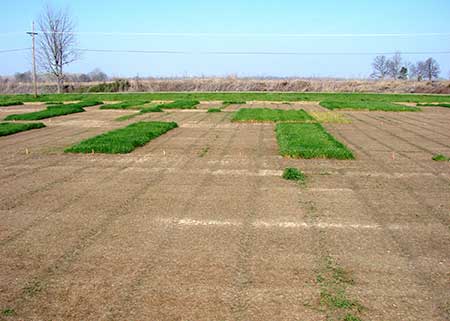News
The information presented on this page may be outdated. It may refer to situations which have changed or people who are no longer affiliated with the university. It is archived as part of Mississippi State University's history.
Control resistant weeds before spring planting

With spring right around the corner, experts say now is the time for producers to control weeds that have developed resistance to commonly used herbicides. (Photo By: Submitted)
2/2/2015
By: Vanessa Beeson
Jason Bond, associate research and Extension professor at the Delta Research and Extension Center in Stoneville, said glyphosate-resistant Italian ryegrass is a problem weed for producers in Mississippi.
"Glyphosate, one of the most widely used herbicides in the U.S., is sold in commercial products such as Roundup," Bond said. "Many weeds, including Italian ryegrass, have developed the ability to survive glyphosate treatments. Italian ryegrass is commonly found in Mississippi's major row crops, including soybeans, cotton, corn, rice and wheat."
Bond said 70 out of 82 counties in Mississippi have some level of glyphosate-resistant Italian ryegrass.
"A minimum of two herbicide applications are required to control this weed," he said. "The applications should be some combination of a fall application between mid-October and mid-November, a winter application between mid-January and mid-February, and a spring application applied sometime around March 1."
MSU researchers in the Mississippi Agricultural and Forestry Experiment Station are studying the problem. In one study, scientists evaluated the benefits of treating for glyphosate-resistant Italian ryegrass before planting corn. They assessed the benefit-to-cost ratio of these treatments by calculating the weed's impact on corn growth rate and yield.
"For every dollar we spent controlling glyphosate-resistant Italian ryegrass before planting corn, we got $13 back on corn yield," Bond said.
MAFES researchers began a related study in 2014 and are continuing the work in 2015. According to their findings, Italian ryegrass needs to be controlled at least a month before corn planting to avoid reduced growth rate and yield loss. Specifically, Italian ryegrass needs to be controlled 28 and 21 days before planting to prevent reduced growth and yield, respectively.
"For every day we didn't control ryegrass, we lost a little over a bushel of corn," Bond said.
Justin George of J.P. George Consulting Service Inc. said plenty of farmers will be focusing on weed control in the coming weeks.
"We are in late-winter herbicide application timing, which overlaps and becomes spring herbicide application timing," George said. "If herbicides weren't applied in fall, we will see a lot of herbicides being applied now, including glyphosate, 2-4D and residual herbicides.
Residual herbicides are applied before crops emerge and stay in the soil for a longer period of time, preventing the emergence of weeds that compete with crops.
George said staying vigilant in controlling weeds can help break the cycle and reduce the amount of new emergence.
"Keep edges, levees and roadsides clean and free from problem weeds," he said. "Also, weed tolerance to herbicides seems to be building in all areas, so residual herbicide applications are necessary across the board."
Lower commodity prices mean tighter budgets.
"High yields seem to be everyone's goal and the best way to combat low prices. High yields will be a necessity this year," George said. "Keeping up with weed control will help producers turn that necessity into a reality."
View More News